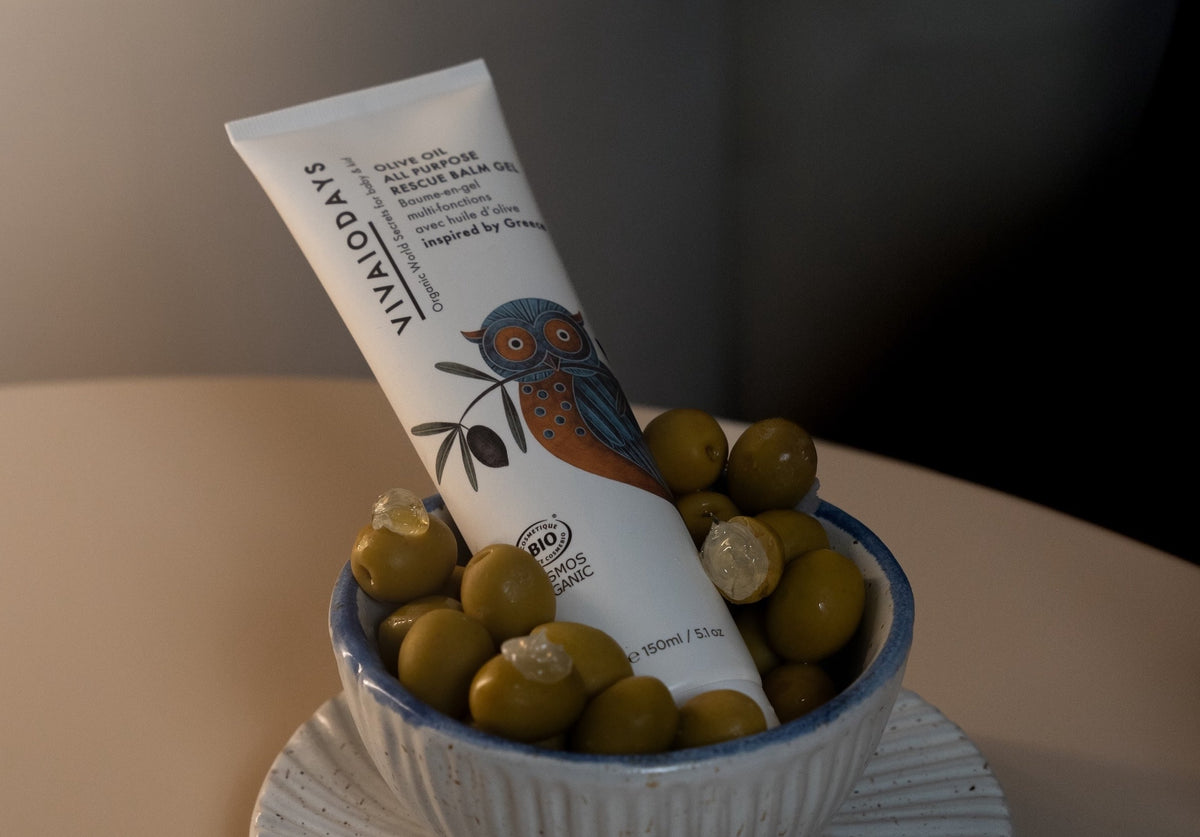
Olive Oil: How Greece's 'Liquid Gold' Heals Skin Concerns & Eczema
|
Time to read 3 min

|
Time to read 3 min
For centuries, olive oil has been more than food- it’s been medicine, ritual and comfort. Long before laboratories and dermatology journals, Mediterranean families used it to soothe burns, cradle wounds, and calm dry skin. Today, science is beginning to affirm what generations already knew: the humble olive carries extraordinary healing power.
When it comes to skin conditions like eczema, where inflammation, dryness, and sensitivity co-exist, not all oils are created equal. The type of olive oil, how it’s pressed, and where it comes from all shape how it behaves on fragile skin.
Cold-pressing is more than a technique; it’s preservation. The moment an olive is crushed, oxygen begins to degrade its most delicate compounds- antioxidants, polyphenols, vitamin E, and squalene- all of which play roles in calming inflammation and protecting the skin barrier.
Cold-pressed extra virgin olive oil, especially when made from early-harvest olives, keeps these molecules intact. This matters because polyphenols such as oleuropein and hydroxytyrosol have been shown to reduce oxidative stress- the same process that worsens eczema flares and slows healing.
In wound-care research, olive oil has demonstrated promising results: it can encourage tissue repair, reduce bacterial load, and modulate inflammation when used in balanced formulations. One 2023 review in Frontiers in Pharmacology described olive oil’s antioxidant and anti-inflammatory molecules as “bio-rescue agents” for damaged skin.
If you’ve ever tasted or smelled Greek olive oil, you know it’s different- vibrant, peppery, alive. The same properties that make it award-winning on the table also make it remarkable for the skin.
Greek olive oil consistently ranks among the best in the world, earning top honours at the NYIOOC World Olive Oil Competition in both 2023 and 2024. Producers from Crete and Peloponnese, working with the ancient Koroneiki variety, have mastered the art of pressing early and cold, capturing the highest levels of antioxidants and the lowest acidity.
These are oils that speak of sun, salt, and mineral-rich soil. Their polyphenol content regularly exceeds that of oils from other regions, giving them exceptional stability and potency. In skincare, this translates to stronger antioxidant activity and gentler protection against dryness and inflammation.
Eczema and wounds share a common story: a weakened barrier that lets moisture escape and irritation in. Healing means rebuilding that barrier- sealing micro-cracks, easing inflammation, and restoring the skin’s microbiome.
Cold-pressed olive oil contributes on all three fronts. Its fatty acids mimic those found naturally in our own sebum, helping fill the gaps between skin cells. Its polyphenols neutralize free radicals generated by chronic inflammation. And its natural squalene softens and protects without suffocating the skin.
Clinical studies have noted that olive oil can accelerate epithelial repair and soothe redness when used as part of multi-ingredient ointments. Dermatologists now understand that the secret lies not in saturation but in synergy — pairing olive oil with humectants and barrier-supporting ingredients so the skin receives its nourishment gradually, without overload.
This philosophy underpins formulations like Vivaiodays’ Rescue Balm Gel and Caper Balm Gel. Each blends cold-pressed Greek olive oil with botanical actives that comfort and cool inflamed skin. In these formulas, olive oil is the anchor ingredient that brings calm and healing to the skin.
Suspended in a lightweight gel texture, the oil is cushioned by hydrating agents that prevent transepidermal water loss and create a breathable seal. This allows the skin to heal in its own rhythm- soothed, protected, never smothered. For parents caring for eczema-prone or sensitised skin, this balance between nature and restraint matters deeply. Rescue Balm Gel is also made with 100% foodgrade ingredients, making it safe even when ingested accidentally.
HOW TO USE
After cleansing, squeeze a small amount to your clean fingertips. The balm melts with the skin’s warmth, sealing in hydration, calming the itch, and easing the redness that often comes with eczema. Used consistently, it helps the skin remember what healthy feels like- supple, calm, and whole.
When reading ingredient lists or product descriptions, look for a few key words: cold-pressed, extra virgin, and ideally, Greek. These signal minimal processing and a high antioxidant profile. Avoid “olive oil blends” or mineral-oil dilutions that strip away the very molecules that make olive oil healing.
And if you’re ever tempted to reach straight for the kitchen bottle- pause. Skin needs a gentler translation of nature’s gifts. The same oil that flavours your food deserves a little refinement before it touches eczema-prone skin.
Olive oil has stood the test of time- valued for its ability to calm, protect, and restore. Today, when formulated with care, it remains one of nature’s most effective ways to support sensitive and eczema-prone skin.
From everyday dryness to irritation recovery, Greek cold-pressed olive oil offers steady, proven nourishment. It doesn’t promise instant transformation- just gentle, lasting repair that helps skin return to balance.

